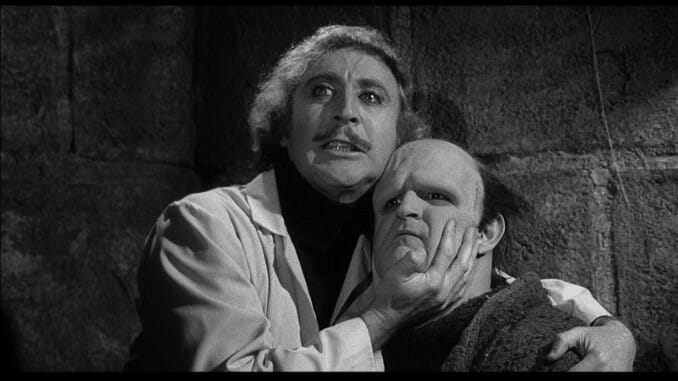
Paste’s ABCs of Horror 2 is a 26-day project that highlights some of our favorite horror films from each letter of the alphabet. The only criteria: The films chosen can’t have been used in 2019’s Century of Terror, a 100-day project to choose the best horror film of every year from 1920-2019, nor last year’s first ABCs of Horror project. With many heavy hitters out of the way, which movies will we choose?
There are few comedies in Hollywood history more universally beloved than the likes of Mel Brooks’ Young Frankenstein, but perhaps the most impressive thing about that adoration is the fact that for many viewers it was earned without anything more than the barest conception of how effective a parody the film truly is. Because rest assured, Young Frankenstein is not merely some broad parody of the general idea of “old monster movies,” or even the Universal horror milieu of the 1930s and 1940s. Rather, it’s a genuinely loving tribute to not one or two but all four films in the Universal Frankenstein series released between 1931 and 1942; a chimera of clever references and allusions that serve to illustrate true passion for the first horror boom of American history. The fact that the film is still hilarious without any of this contextual knowledge speaks to its exceptional performances and gags, but appreciation for Young Frankenstein is only deepened by embracing the films that served as its inspiration.
As a viewer, I am a clear illustration of this principle—the first time that I saw Young Frankenstein, it was likely as a teenaged fan of raunchy Mel Brooks comedies such as Blazing Saddles or History of the World, Part I, rather than a lover of 1930s Universal horror. Certainly, I knew some of the tropes of James Whale’s Frankenstein and that era of Universal monster movies, as even those who have never watched any of these films have still absorbed phrases such as “it’s alive!” via the constant recycling of them in Halloween season pop culture. But on a deeper level, most of the allusions of Young Frankenstein were lost on me at that time, and would be for years until I began to go back and watch films such as Son of Frankenstein or Ghost of Frankenstein in earnest.
And more than anything, it’s these Frankenstein sequels where Brooks’ film truly finds its greatest inspirations, especially Son of Frankenstein. As in that 1939 classic, which reinvigorated the horror genre after a brief period of dormancy, the story concerns itself with a scion of the now infamous Frankenstein (uh, “Frahn-ken-steen”) family, who grapples with the dark legacy of a grandfather who chose to play God and doom a poor Creature to a cursed existence. So too does Frederick Frankenstein (Gene Wilder) do everything in his power to resist the temptation of carrying on the family legacy, cognizant of the lives that were previously destroyed by exactly this kind of arrogance. But just like Basil Rathbone’s Wolf Frankenstein in Son, so too does Frederick ultimately succumb to the seductive pull of forbidden knowledge—both films are about men who should know better, ultimately being coerced into making the same mistakes as their forebears. Almost every character and scenario, in fact, likewise forms some sort of direct reference or callback to the Universal originals, from the one-armed inspector of Son of Frankenstein, to the kindly hermit of Bride of Frankenstein or the eventual brain-swapping scheme of Ghost of Frankenstein.
Granted, none of the referential material would matter without the script and the performances to back it up, and in this arena Young Frankenstein immediately ascends to mythic status among Hollywood farces, utterly timeless in the perfection of its comedic delivery. Has anyone ever been more perfectly cast in a comedic role than Gene Wilder as Frederick Frankenstein? Well, perhaps Marty Feldman as Igor. Or Cloris Leachman as Frau Blücher. Or Peter Boyle as The Monster. Or pretty much every other member of this film’s cast, all of whom vie for its best lines and most impeccable deliveries. As in many of Brooks’ greatest works, the comedic ensemble comes together in a way that would be impossible to replicate in any ill-advised remake.
Still, Wilder’s performance does demand individual praise, as he finds a way to perfectly balance the gravitas of a Shakespearean actor such as Basil Rathbone with the wild-eyed raving and exaggerated cowardice of a vaudeville fool. Few actors have ever possessed such a talent for vacillating from one such extreme to the other, something Wilder mines for laughs in sequences like the one where he instructs his assistants to NOT OPEN THIS DOOR no matter what they may hear, and then immediately begs for release as soon as the door is shut behind him. It’s such an obvious gag, with a blatant setup that even a child could anticipate, but in Wilder’s hands the payoff is enormous because the man was simply that skilled in the way he inhabits a caddish character.
In almost half a century since, only a handful of horror comedies have been able to make a case for being in the same conversation as Young Frankenstein. It has become an icon, against which an entire subgenre is judged.
Jim Vorel is a Paste staff writer and resident horror guru. You can follow him on Twitter for more film and TV writing.